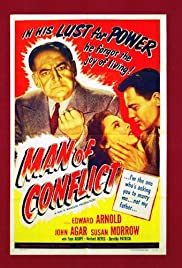
MAN OF CONFLICT
US, 1953, 72 minutes, Black-and-white.
Edward Arnold, John Agar, Susan Morrow, Fay Roope, Dorothy Patrick.
Directed by Hal R.Makelim.
Edward Arnold made a career out of portraying strong bosses, a big man, forceful, often bullying. Think It’s a Wonderful Life.
This is a strong role almost at the end of his career. He plays a self-made industrialist, admitting no errors, taking no prisoners, ruthless in his demands and expectations. His son, played by John Agar, his returning home and the plan is for him to take over the business. The son wants to spend time on the floor, working on the lathe, anonymously, gaining experience.
The girlfriend returns from Europe, loudly talking about his work with the workers then discovering who he was, hostility towards him because of his father. On the road, he is bashed by some thugs. His father is ruthless in trying to find out who the thugs were, sacking 10 workers a day, firing the man who helped his son and organising his daughter to be fired from the bank.
This is the 1950s, with echoes of red agitators, industrial relations. While Edward Arnold is powerful on screen, this is a good performance by John Agar, especially in a scene at the end with his father where we do not hear the father but see only the son’s facial response.
Interesting to compare industrial relations in those years with current situations and disputes.
1. A story of business and industry? In the 1950s? Issues of unions? Issues of big bosses and autocracy? Intimations of Leftist and Communist agitation?
2. The industry town, mansions, socials, the contrast with the similar houses in the streets, the workplaces? The musical score?
3. Edward Arnold as Compton, his expertise at this kind of role? Self-made, working on the floor, building himself up, his marriage and the portrait of his wife, ambitions for his son? Welcoming him back? The orders to change the sign, the sacking of the official? As a person, personality, absolutely right, not admitting any mistakes, peremptory with people, sackings?
4. Ray, returned from college, his upbringing, memories of his mother? Inheriting the company? His relationship with his father? His decision to go on the floor, the months passing, the year, his working with Jenks, anonymous? Jenks and his hostility, change, their working together? A sense of achievement?
5. Betty, her return, his identity, the past relationship, the plans? His reaction to her snobbery? Her returning, her looking down on the working class? His rejecting her?
6. Ray with Jenks, not putting on the glasses, the accident? Going to the hospital? His father’s severe reaction, sacking Jenks, bringing the bank manager, firing Jane? Ray and his visit to Jenks and his family, wanting to apologise, hearing the phone call with Jane fired?
7. Ray, confrontation with his father, organising the union meeting? Getting some support? His appeal to his father, Jenks and Jane being rehired? His father wanting the identity of the thugs? Sacking 10 people a day? Going back on this decision?
8. The buildup to the confrontation between father and son, Ray ready to walk away, his concern about people, security, ambition? His father’s comments about weakness and his mother?
9. Compton, going to the floor, back at the lathe, making something? His phone call to Jenks and to Ray?
10. The meeting, everybody at the table, Compton and his mellowing, the gift to Jane of the necklace, the gift to Ray of what he had made at the lathe?
11. A film of the 1950s? Industrial relations? How relevant to later decades?